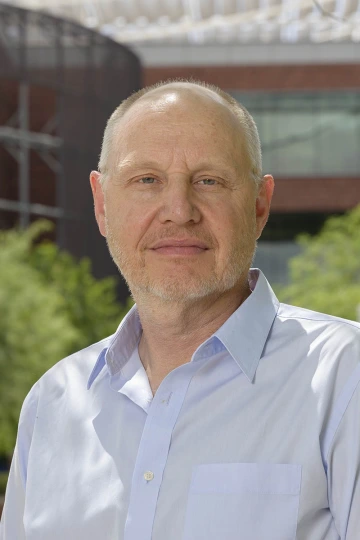Dr. Hendrikus Granzier receives 2023 Koffler Prize
Hendrikus “Henk” Granzier, PhD, a professor of cellular and molecular medicine at the University of Arizona College of Medicine – Tucson, received the 2023 Henry and Phyllis Koffler Prize from the UArizona Office of the Vice Provost for Faculty Affairs. The Koffler Prize recognizes outstanding accomplishments in research, scholarship and creative activity.

Hendrikus “Henk” Granzier, PhD
“To be successful in research requires a large team of students and colleagues and entails a lot of hard work and late nights,” said Dr. Granzier, who has additional faculty appointments in physiology at the College of Medicine – Tucson and molecular and cellular biology at the UArizona College of Science. “Receiving the Henry and Phyllis Koffler Prize is a tremendous honor for all of us and is highly rewarding.”
Dr. Granzier also is the Allan and Alfie Norville Endowed Chair in Women’s Heart Disease at the UArizona Sarver Heart Center and a member of the BIO5 Institute.
“My research is multifaceted and collaborative,” Dr. Granzier said. “It asks critical questions with a goal to move the boundaries of our field of research. Creativity is an important aspect and is emphasized because it is often mandatory to achieve rapid advances in research.”
Dr. Granzier’s nomination letter was signed by several of his colleagues in the Department of Cellular and Molecular Medicine including Gregory Rogers, PhD, professor and associate head for faculty development; Yana Zavros, PhD, professor and associate head for research; Noel Warfel, PhD, associate professor; and Carol Gregorio, PhD, former professor and department head.
The letter stated: “Dr. Granzier’s work has brought global recognition and prestige to our university. He has presented his work at nearly 200 invited seminars at universities, meetings and symposia. He has established one of the most productive and well-funded research programs in the world in muscle elasticity and its functional contribution to disease pathology.”
Dr. Granzier’s pioneering research on titin, the largest known protein, has shown that it is critically important in health and heart disease.
“Titin is found in our muscles where it is an abundant protein, with the average adult body containing about a pound of titin,” he said. “Despite its abundance, the functions of titin have been unknown for the longest time. My research has discovered that the titin molecule functions as a molecular spring that, in muscle tissues that are stretched, develops a restoring force. Importantly, in heart disease titin can malfunction by being too stiff and rigid, and as a result it prevents the heart from appropriately filling and heart failure can result from this condition. Additionally, mutations in titin have been discovered to result in a type of heart failure with deteriorating pump function of the heart.”
Dr. Granzier said the support he receives from his colleges and departments has been critical to his success in research. “They have created an environment that is highly supportive of basic and translational research.”

